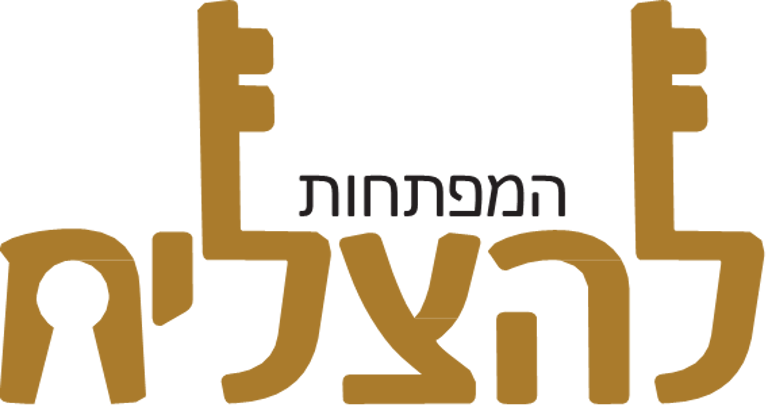Recommended Books
Carefully selected books that I personally recommend - each one practical, therapeutic, and grounded in real, effective strategies for growth. Ideal for individuals seeking insight and for clinicians looking to support their clients with proven tools.
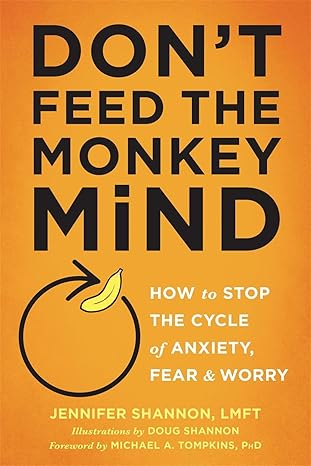

Don't Feed the Monkey Mind: How to Stop the Cycle of Anxiety, Fear, and Worry by Jennifer Shannon, LMFT
A Brief explanation of the book:
This engaging guide explains how our attempts to control anxiety often backfire and feed it instead. Using the metaphor of a noisy “monkey mind,” it helps readers recognize anxious thoughts, stop reinforcing them, and break free from the cycle of fear and avoidance. The author, an experienced therapist, offers a practical, step-by-step CBT-based method to retrain the brain and cultivate inner peace.
Age range:
Ages 16 and up — appropriate for older teens, young adults, and adults who can engage with therapeutic ideas and apply them independently or in therapy.
Recommended for:
Anyone struggling with anxiety, chronic worry, panic, or avoidance. It’s also an excellent tool for therapists and clinicians who want an accessible and effective resource to use with their clients in sessions or as homework.
Evidence-Based Practices:
This book incorporates Cognitive Behavioral Therapy (CBT), Exposure Therapy, and Acceptance and Commitment Therapy (ACT). It teaches core therapeutic techniques like thought defusion, mindfulness, exposure, and behavioral activation—all supported by research and clinical outcomes.
Why I recommend it:
I recommend this book because it’s clear, relatable, and above all—practical. The metaphor of “feeding the monkey” makes complex mental habits easy to understand. I’ve found it helpful not only for clients who feel trapped in anxious patterns, but also for clinicians seeking straightforward tools to guide effective therapy.
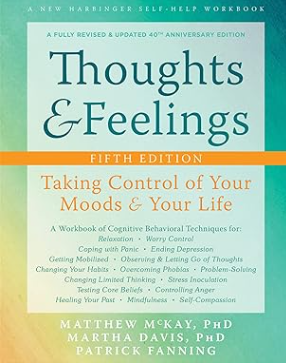

Thoughts and Feelings: Taking Control of Your Moods and Your Life
by Matthew McKay PhD, Martha Davis PhD, and Patrick Fanning
A Brief explanation of the book:
This fully updated 40th anniversary edition is a comprehensive, easy-to-read workbook for managing emotional struggles and transforming your inner world. It includes over twenty evidence-based techniques and a helpful chart that guides readers—based on specific mental health challenges—to the most relevant chapters to begin with, making it both structured and personalized.
Age range:
Ages 17 and up — suitable for older teens and adults who are ready to work actively on their emotional well-being.
Recommended for:
Individuals facing depression, anxiety, anger, low self-worth, or emotional overwhelm, and clinicians seeking a rich, adaptable resource for clients. It’s excellent for self-help, therapy sessions, or as guided reading between sessions.
Evidence-Based Practices:
The book integrates tools from Cognitive Behavioral Therapy (CBT), Acceptance and Commitment Therapy (ACT), mindfulness, self-compassion, habit reversal, and value clarification. Each approach is backed by research and widely used in therapeutic settings.
Why I recommend it:
This book is a treasure for both clients and therapists—clear, structured, and deeply practical. The guide chart makes it easy to jump in based on your specific need, and the writing is accessible and empowering. I’ve used it often in therapy to help clients understand themselves and make meaningful progress.
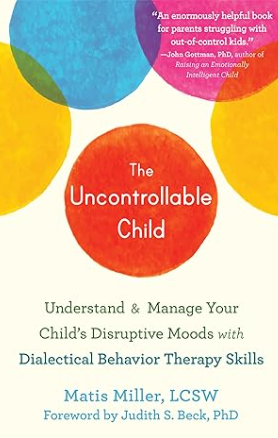

The Uncontrollable Child: Understand and Manage Your Child’s Disruptive Moods with Dialectical Behavior Therapy Skills
by Matis Miller, LCSW
A Brief explanation of the book:
This insightful and compassionate guide is specifically designed for parents raising emotionally intense and dysregulated children. Grounded in Dialectical Behavior Therapy (DBT), it provides practical tools - like mindfulness, validation, limit-setting, and behavior shaping - to help parents respond effectively and lovingly to outbursts, rage, and impulsivity. The book strikes a vital balance between firm structure and deep emotional understanding.
Age range:
Aimed at parents of children and teens aged approximately 6 to 18 who struggle with emotional dysregulation and behavioral challenges.
Recommended for:
Parents of children with explosive tempers, mood dysregulation, or challenging behaviors - particularly those with diagnoses like DMDD, ADHD, or autism spectrum features. Also recommended for clinicians and therapists who work with families navigating emotional and behavioral crises.
Evidence-Based Practices:
This book is rooted in Dialectical Behavior Therapy (DBT), an evidence-based treatment approach known for helping individuals with intense emotional responses. It applies DBT skills to the parenting context, offering techniques like radical acceptance, emotional validation, and consistent boundary-setting.
Why I recommend it:
This is one of the best practical resources for parents dealing with truly difficult behaviors. It’s clear, relatable, and deeply validating. I recommend it often to families—and use it myself in clinical work—because it empowers parents with skills and confidence while nurturing a more peaceful, connected home.
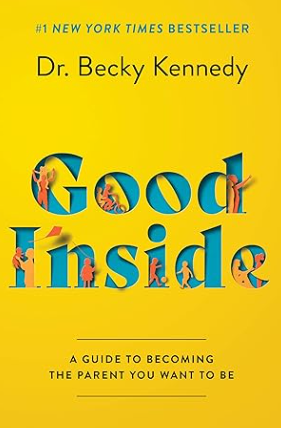

Good Inside: A Practical Guide to Resilient Parenting Prioritizing Connection Over Correction
by Dr. Becky Kennedy
A Brief explanation of the book:
This bestselling parenting guide introduces a revolutionary yet deeply compassionate model: that all children (and parents) are good inside. Instead of relying on behavior-based tools like rewards and punishments, Dr. Becky focuses on connection, emotional regulation, and long-term resilience. Through real-life examples and practical tools, she helps parents become sturdy leaders while fostering emotional growth in their children.
Age range:
Geared toward parents of children from toddlerhood through adolescence. Also relevant for educators and therapists working with families.
Recommended for:
Parents who feel overwhelmed, burnt out, or unsure how to handle daily struggles like tantrums, anxiety, sibling fights, or big emotions. It’s also valuable for clinicians seeking a modern, emotionally-attuned parenting model to share with clients.
Evidence-Based Practices:
While written in an accessible tone, the book is built on principles from attachment theory, emotional regulation, internal family systems (IFS), and trauma-informed care. It emphasizes co-regulation, validation, and long-term skill-building—backed by psychological and developmental research.
Why I recommend it:
I recommend Good Inside because it validates both parents and children while offering clear, actionable guidance. It shifts the focus from controlling behavior to building relationships and emotional strength. It’s become a go-to in my work with parents who want to raise resilient, connected, and emotionally secure children.
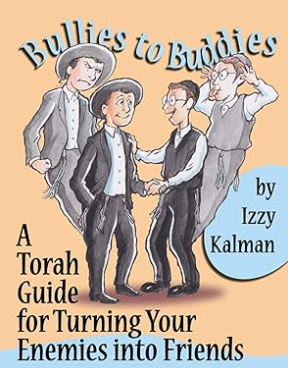

Bullies to Buddies: A Torah Guide for Turning Your Enemies into Friends by Izzy Kalman
A Brief explanation of the book:
This Torah-based guide offers a powerful, practical approach for Jewish students who face bullying, ridicule, or exclusion. Drawing on timeless Torah values and modern psychology, Izzy Kalman teaches readers how to understand social dynamics, disarm cruelty, and turn hostility into friendship—all through the transformative power of ve’ahavta lere’acha kamocha.
Age range:
Ideal for ages 10 to 18—especially suited for talmidim and talmidos in elementary and high school settings.
Recommended for:
Children and teens in yeshivos or Jewish schools who are experiencing bullying, social difficulties, or peer conflict. It’s also recommended for parents, mechanchim, and clinicians who want a Torah-aligned, emotionally intelligent approach to help children navigate challenging social situations.
Evidence-Based Practices:
While steeped in Torah values, the book is grounded in principles of cognitive-behavioral therapy (CBT), conflict resolution, and social-emotional learning. It teaches readers to remain calm, confident, and non-reactive—proven methods for reducing bullying dynamics.
Why I recommend it:
I personally use Bullies to Buddies with my clients and have seen firsthand how empowering it is. It teaches children to stand tall without fighting back, and to change social dynamics by changing their own reactions. It's practical, deeply aligned with Torah values, and life-changing for anyone struggling with peer rejection or bullying.
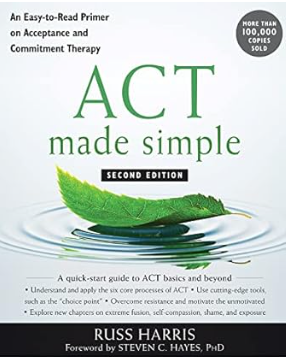

ACT Made Simple: An Easy-to-Read Primer on Acceptance and Commitment Therapy
by Russ Harris (Foreword by Steven C. Hayes, PhD)
A Brief explanation of the book:
This fully updated second edition is a clear, accessible guide to Acceptance and Commitment Therapy (ACT). It explains the six core ACT processes—such as defusion, acceptance, values, and committed action—in a user-friendly, practical way. With scripts, metaphors, worksheets, and real therapy transcripts, it equips therapists to apply ACT in-session and help clients make meaningful, lasting change.
Age range:
Best suited for mental health professionals, graduate students, and advanced practitioners. Also useful for clients seeking to understand ACT in plain language.
Recommended for:
Therapists, social workers, coaches, and clinicians looking to integrate ACT into their practice or deepen their existing ACT skills.
Evidence-Based Practices:
ACT is a third-wave behavioral therapy with strong empirical support across multiple diagnoses, including anxiety, depression, trauma, OCD, and personality disorders. The book emphasizes mindfulness, acceptance, values clarification, and psychological flexibility—core mechanisms shown to promote clinical progress and emotional resilience.
Why I recommend it:
I personally use ACT Made Simple in my clinical work and find it incredibly effective. It breaks down complex theory into relatable, usable tools for real sessions. Whether you’re just starting with ACT or looking to sharpen your skills, this book is an invaluable guide to helping clients move from stuckness to meaningful action.
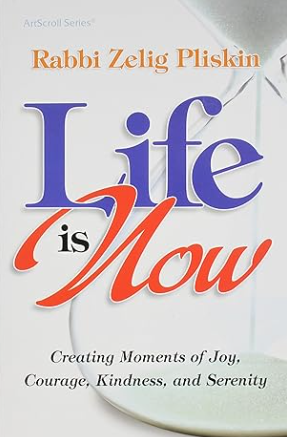

Life Is Now: Creating Moments of Joy, Courage, Kindness, and Serenity by Rabbi Zelig Pliskin
A Brief Explanation of the Book:
This uplifting book guides the reader toward a more joyful and fulfilling life by embracing the power of the present moment. Rabbi Zelig Pliskin encourages readers to shed regrets of the past and worries about the future, and instead focus on what they can do now to live meaningfully. Through stories, insights, and practical advice, the book shows how to cultivate gratitude, serenity, self-acceptance, and emotional resilience.
Age Range:
Ages 16 and up — suitable for teens, adults, and seniors looking for emotional growth and spiritual clarity.
Recommended for:
Individuals struggling with stress, self-criticism, or low mood; positive psychology, or self-help literature; therapists and educators looking for gentle, values-based approaches to personal development.
Evidence-Based Practices:
While not an academic or clinical text, the book promotes mindfulness, cognitive reframing, gratitude practice, and self-compassion — all of which are strongly supported by contemporary psychological research, especially in the fields of Acceptance and Commitment Therapy (ACT), positive psychology, and CBT.
Why I Recommend It:
Rabbi Pliskin has a uniquely warm, sincere, and accessible style that inspires immediate application of deep truths. This book has personally helped me — and many of my clients — shift from ruminating or worrying to living intentionally and positively in the present moment. It’s one of those rare books that’s both emotionally comforting and practically empowering.
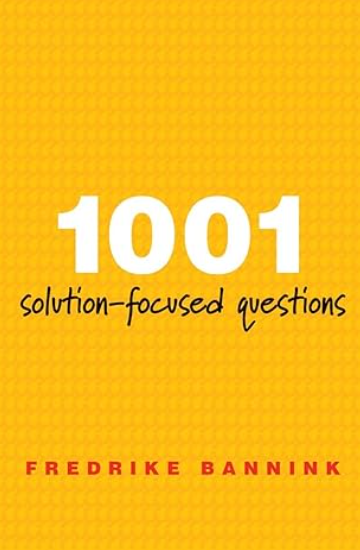

1001 Solution-Focused Questions: Handbook for Solution-Focused Interviewing (2nd Edition) by Fredrike Bannink
A Brief Explanation of the Book:
This comprehensive handbook presents over a thousand practical, categorized questions designed to enhance the effectiveness of solution-focused therapy. It emphasizes eliciting the client's strengths and goals, utilizing language that fosters empowerment. The book includes case examples, training exercises, and homework suggestions, making it both a teaching manual and a clinical toolkit.
Age Range:
Best suited for therapists and professionals working with adolescents, adults, couples, and families. Some sections also include questions appropriate for children and youth.
Recommended for:
Therapists, social workers, counselors, coaches, and educators looking to implement solution-focused strategies. Especially helpful for those practicing brief therapy, CBT, or strengths-based approaches.
Evidence-Based Practices:
The content is deeply rooted in the principles of Solution-Focused Brief Therapy (SFBT), an evidence-based modality that has been supported by numerous studies across clinical populations. The book integrates structured protocols and tested interventions proven to promote positive therapeutic outcomes.
Why I Recommend It:
This book is a goldmine for therapists who want to shift the focus from problems to possibilities. It provides a practical, ready-to-use question bank that enhances sessions instantly. I’ve personally seen how even small changes in phrasing can invite hope, autonomy, and creativity in clients—and this book trains you exactly how to do that.
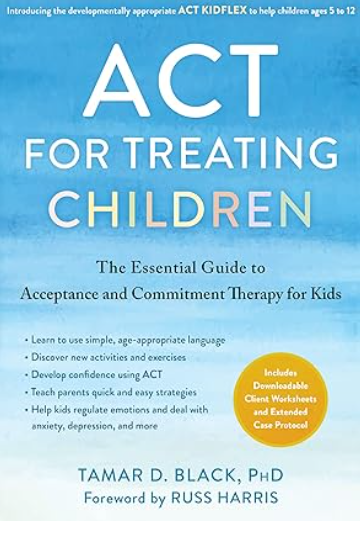

ACT for Treating Children: The Essential Guide to Acceptance and Commitment Therapy for Kids by Tamar D. Black, PhD (Foreword by Russ Harris)
A Brief Explanation of the Book:
This hands-on clinical guide adapts the powerful principles of Acceptance and Commitment Therapy (ACT) for use with children ages 5–12. It presents the simplified “Kidflex” model based on the ACT Hexaflex and includes case studies, worksheets, session plans, and easy-to-use tools for both therapists and parents. The book helps kids build emotional resilience, develop flexible thinking, and strengthen coping skills.
Age Range:
Primarily designed for children aged 5 to 12.
Recommended for:
Mental health clinicians, school psychologists, play therapists, and counselors working with young children experiencing anxiety, depression, stress, or behavioral challenges.
Evidence-Based Practices:
Grounded in ACT, which is an empirically supported therapy backed by over 1,000 research studies. This book adapts ACT's six core processes (e.g., mindfulness, values, acceptance) into developmentally appropriate techniques for children.
Why I Recommend It:
This is one of the most practical and well-designed ACT resources tailored for young kids. It makes complex psychological concepts accessible, and includes ready-to-use tools that work in real-life therapy sessions. It also offers concrete strategies to engage parents as part of the healing process, which is essential for long-term success in child therapy.
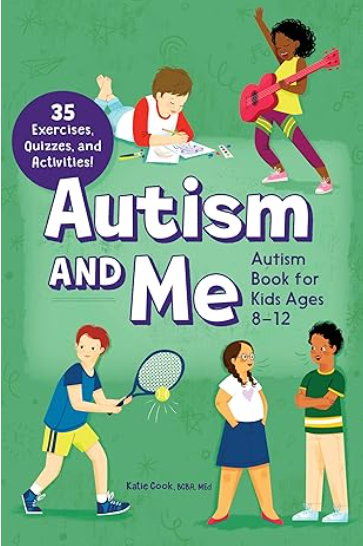

Book Name and Author:
Autism and Me: An Empowering Guide with 35 Exercises, Quizzes, and Activities! by Katie Cook, MEd, BCBA
A Brief Explanation of the Book:
This engaging and interactive guide helps children with Autism Spectrum Disorder (ASD) understand themselves better through fun, evidence-based exercises. With relatable stories, positive language, and strengths-focused content, the book empowers children to embrace their identity, build communication skills, manage emotions, and navigate life’s challenges with confidence.
Age Range:
Ages 8–12
Recommended for:
Children with ASD, their parents, therapists, special educators, and anyone supporting a neurodiverse child in self-awareness and self-advocacy.
Evidence-Based Practices:
The book is grounded in principles from Applied Behavior Analysis (ABA) and integrates strategies that reflect current best practices in autism education, including emotional regulation, social skills training, self-care routines, and functional communication. It also incorporates strengths-based cognitive-behavioral approaches.
Why I Recommend It:
This book is for both professionals and families. It avoids deficit-based language and instead encourages kids to explore and appreciate their unique brains. The exercises are developmentally appropriate, engaging, and deeply validating. I especially appreciate how it helps children understand themselves with pride and equips them with real-life tools to succeed socially, emotionally, and academically.
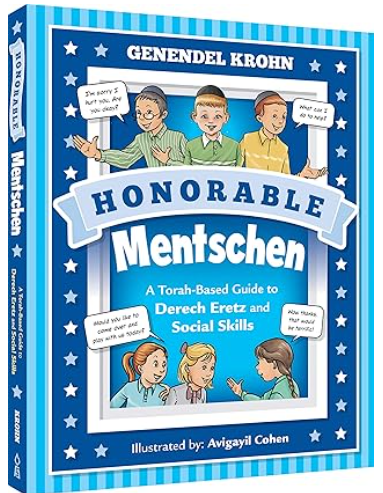

Honorable Mentschen by Genendel Krohn,
A Brief Explanation of the Book:
This engaging and beautifully illustrated book presents nearly 50 relatable, real-life scenarios that help children understand and internalize essential middos (character traits) and derech eretz (respectful behavior). With stories, teachings from Chazal, and interactive reflections, it invites children to become true mentschen - people of honor and goodness.
Age Range:
Recommended for ages 6-12
Recommended for:
Parents, teachers, and anyone seeking to instill Torah-based values in children in an appealing and age-appropriate way.
Evidence-Based Practices:
The book uses educational best practices like scenario-based learning, guided reflection, and modeling positive behavior. Its storytelling approach encourages perspective-taking and emotional awareness - tools supported by child development research in social-emotional learning.
Why I Recommend It:
I personally read and shared this book with my own students and children. It’s a joyful, practical, and deeply Jewish resource that brings middos to life in a way kids understand and enjoy. The clear examples and charming illustrations make it both a chinuch tool and a pleasure to read.
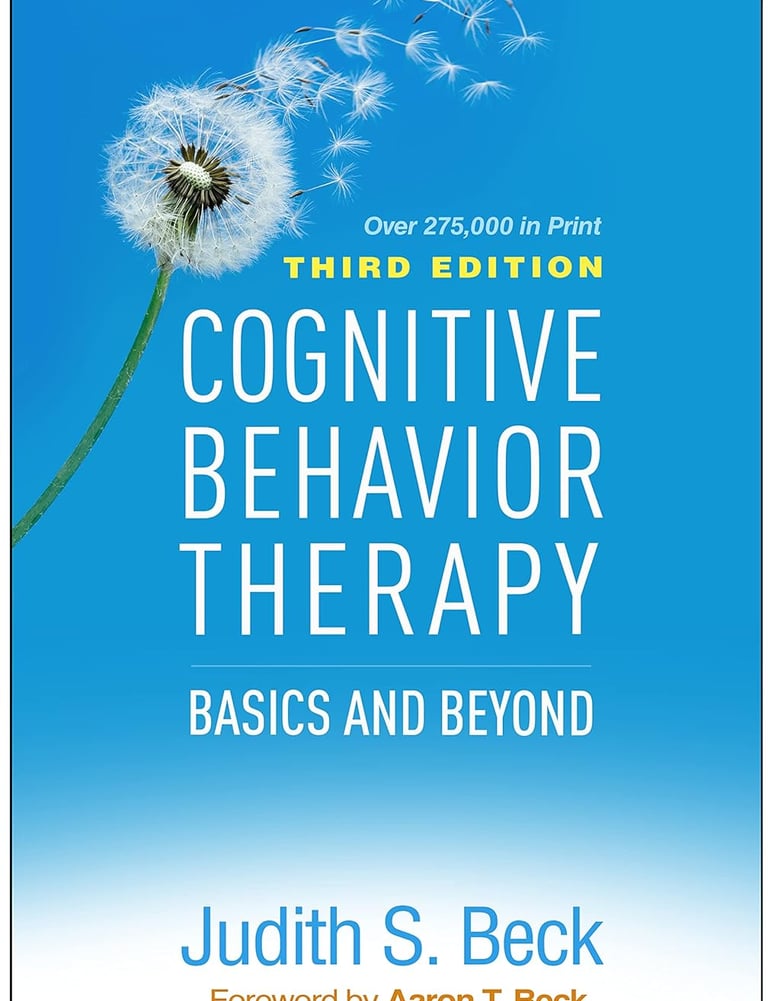

Cognitive Behavior Therapy: Basics and Beyond (Third Edition)
by Judith S. Beck, Foreword by Aaron T. Beck
This book is the classic, step-by-step guide to learning and practicing CBT, fully revised with over 50% new material. Judith Beck introduces the fundamentals of CBT with clarity, warmth, and depth, showing how to build case conceptualizations, structure sessions, and use cognitive, behavioral, and experiential techniques effectively. Real clinical cases of clients with depression, anxiety, and personality traits illustrate concepts in practice.
Age range: Primarily for adults – graduate students, clinicians-in-training, and practicing mental health professionals.
Recommended for: Therapists, counselors, social workers, psychologists, psychiatrists, and advanced students who want a practical yet comprehensive manual for CBT, as well as seasoned practitioners seeking updated approaches like mindfulness, ACT, DBT, and recovery-oriented cognitive therapy.
Evidence-Based Practices: This edition integrates the latest CBT research, including mindfulness-based strategies, acceptance and commitment therapy elements, dialectical behavior therapy tools, and the strengths-based Recovery-Oriented Cognitive Therapy (CT-R). Worksheets, practice exercises, and companion videos reinforce evidence-based skills.
Why I recommend it: It is one of the clearest and most practical texts for mastering CBT. Whether you’re new to CBT or refining advanced skills, this book balances theory with real-world application, making it indispensable for effective clinical work. It not only teaches techniques but a
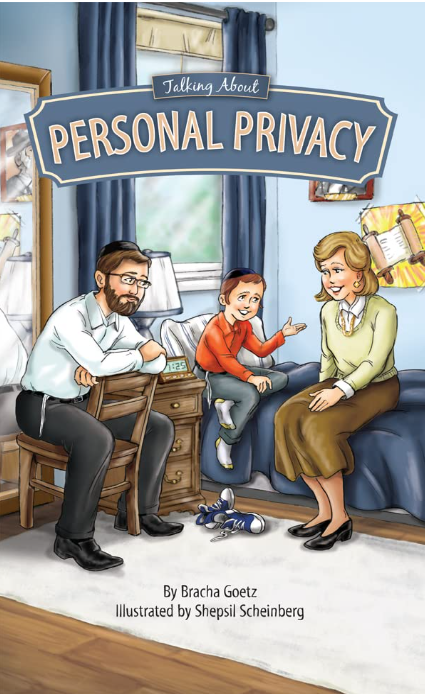

Talking About Personal Privacy by Bracha Goetz (Author), Shepsil Scheinberg (Illustrator)
This book gently guides parents and children into the vital conversation about body safety, dignity, and respect, presented with warmth, clarity, and tzniyus. Through simple words and engaging illustrations, it empowers families to openly discuss sensitive topics in a wholesome and protective way.
Age range: 4–10 years old.
Recommended for: Parents, educators, therapists, and community leaders seeking to teach children about personal safety and boundaries in a positive and modest framework.
Evidence-Based Practices: The book draws upon insights from mental health professionals, rabbinic guidance, and child-safety research. Its approach is consistent with evidence that early, open, age-appropriate discussions on body boundaries significantly reduce the risk of victimization.
Why I recommend it: This book offers a safe, respectful, and Jewishly sensitive tool for parents to address a delicate but essential topic. It helps foster trust, safety, and awareness in children, while strengthening family communication and empowering them with life-long protective skills.
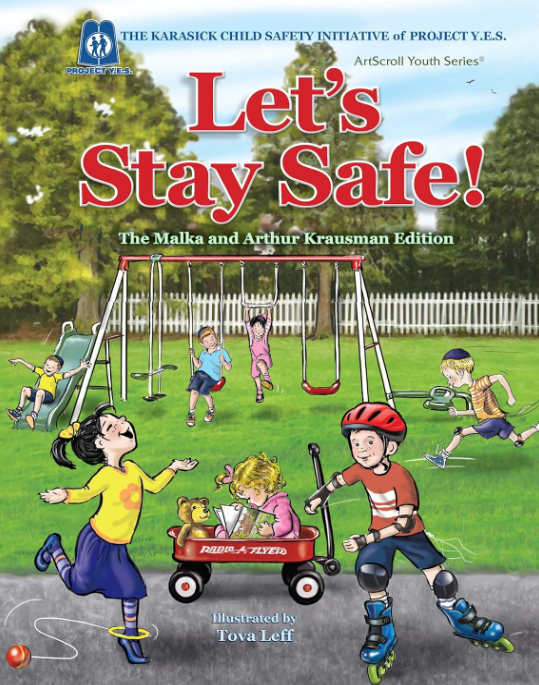

Let's Stay Safe! by Bracha Goetz (Author), Tova Leff (Illustrator)
This engaging picture book teaches children essential safety rules in a warm, rhyming, and age-appropriate style. Covering topics such as stranger awareness, street safety, bicycle rules, fire precautions, and home safety, it helps children internalize life-saving lessons without instilling fear.
Age range: 3–8 years old.
Recommended for: Parents, teachers, and caregivers who want to empower children with safety awareness in a positive and reassuring way.
Evidence-Based Practices: Developed with the Karasick Child Safety Initiative of Project Y.E.S., the book integrates research-backed approaches: teaching through repetition, visual cues, and simple rhymes proven to increase retention in young children. It promotes proactive discussions that normalize safety skills.
Why I recommend it: This book transforms critical safety lessons into a joyful learning experience. Instead of scaring children, it builds their confidence and equips them with the tools to make safe choices in daily life, while reassuring parents that they are giving their children protective knowledge in a loving, child-friendly way.
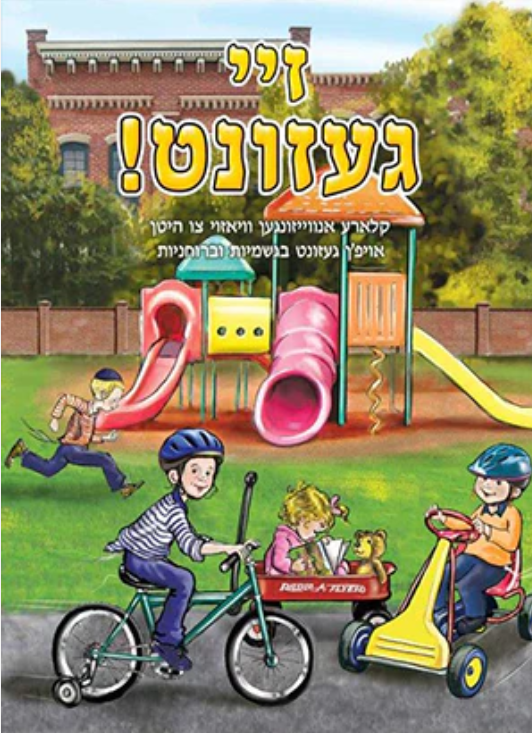

Zei Gezunt! — Yiddish Version of our Child Safety Book
This engaging picture book teaches children essential safety rules in a warm, rhyming, and age-appropriate style. Covering topics such as stranger awareness, street safety, bicycle rules, fire precautions, and home safety, it helps children internalize life-saving lessons without instilling fear.
Age range: 3–8 years old.
Recommended for: Parents, teachers, and caregivers who want to empower children with safety awareness in a positive and reassuring way.
Evidence-Based Practices: Developed with the Karasick Child Safety Initiative of Project Y.E.S., the book integrates research-backed approaches: teaching through repetition, visual cues, and simple rhymes proven to increase retention in young children. It promotes proactive discussions that normalize safety skills.
Why I recommend it: This book transforms critical safety lessons into a joyful learning experience. Instead of scaring children, it builds their confidence and equips them with the tools to make safe choices in daily life, while reassuring parents that they are giving their children protective knowledge in a loving, child-friendly way.
Disclaimer: Some of the links on this page are Amazon affiliate links, which means I may earn a small commission if you make a purchase—at no extra cost to you. These are genuinely honest recommendations of books I personally bought, read, and use regularly in my work.

© 2024. All rights reserved.
